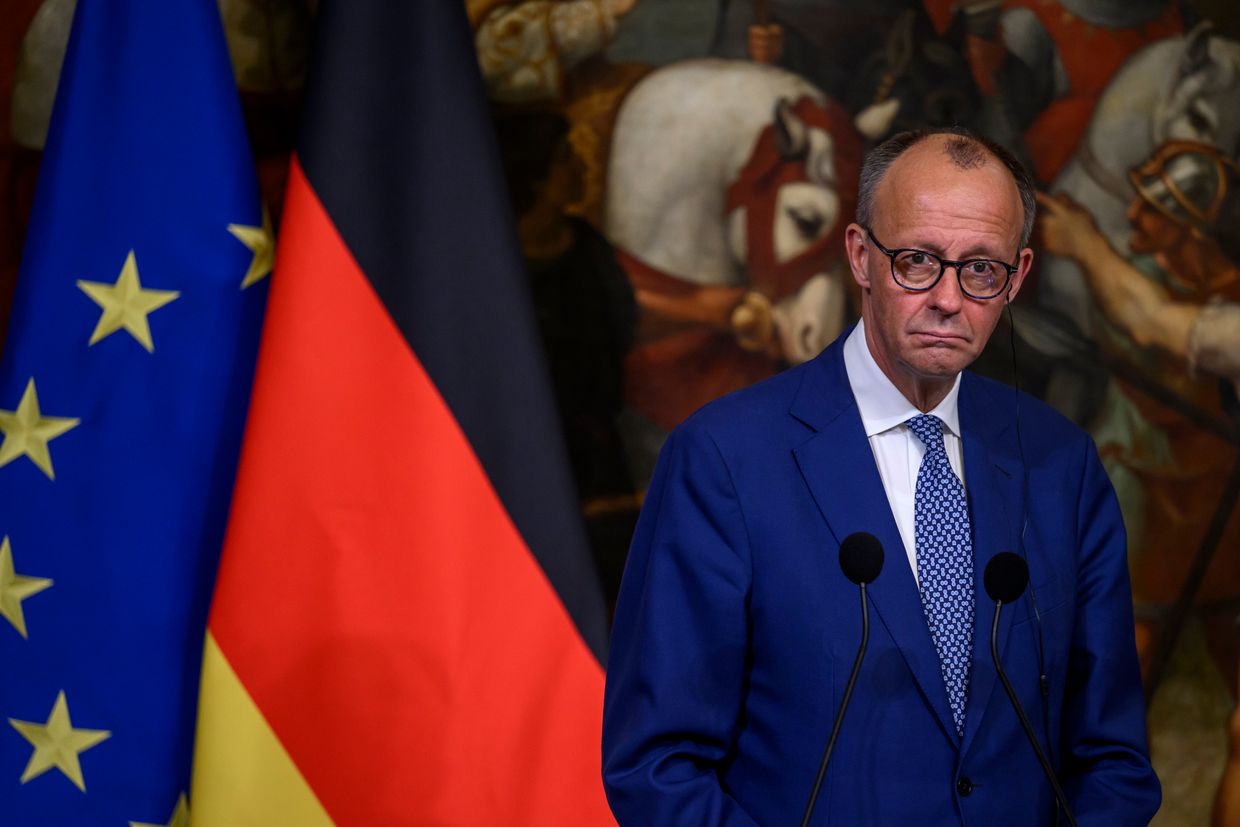America’s weak strongman

US President Donald Trump in the Oval Office of the White House in Washington, DC, on June 10, 2025. (Saul Loeb / AFP via Getty Images)

Timothy Snyder
American author and historian
Over the past two months, financial investors have hit upon a new trading strategy, based on a simple rule: TACO — Trump Always Chickens Out. America’s president threatens to slap massive import tariffs on friends and foes alike, or to remove the Federal Reserve chair, only to back down when the whip of the market imposes its uncompromising discipline. Then he switches back to tariffs, only to back down yet again.
It’s a pattern that extends beyond the economy. In fact, it’s the defining feature of Donald Trump’s presidency. But Trump is not just “chicken.” He is a weak strongman, and America’s adversaries may understand that better than most Americans.
Many Americans fear Trump, so they imagine that others must, too. But no one outside America fears Trump as such. America’s friends fear an arsonist — someone who destroys what others have created. And America’s enemies welcome the destruction wrought by Trump and by Elon Musk’s Department of Government Efficiency. When Musk recently stepped down, the leading Kremlin ideologue Alexander Dugin lamented his departure: “DOGE made a great favor to the entire world by liquidating USAID, Health department and Department of education.”
Trump is strong in a relative sense; after he destroys institutions, what remains is his presence. But he is weak because, having destroyed the government departments overseeing money, weapons, and intelligence, the United States has no actual tools to deal with the rest of the world. He plays a strongman on television, and he is a talented performer. But his strength consists solely in his audience’s submissiveness. His performance arouses a dream of passivity: Trump will fix it.

To be sure, Trump’s charisma is a kind of strength. But it cannot be brought to bear on any problem, and it is irrelevant outside the U.S. Trump’s supporters might think that America needs no friends because it can intimidate its enemies without help. But we already know that Trump cannot make Canada or Mexico — much less China, Iran, or Russia — do his bidding.
That only works at home. For years, Trump has used rallies and social media to inspire random violence against his domestic opponents. This has led to a self-purge of the Republican Party and forged a docile cohort of congressional cadres. The people who submit to Trump perceive him as a strongman, but what they are experiencing is their own weakness. And their weakness cannot magically become strength in the wider world.
The capital letters and exclamation points in social-media posts that Trump has directed at Russian President Vladimir Putin in recent months, demanding that he stop the war in Ukraine, have had no effect on Putin’s emotional state, let alone on Russian policy. And inciting stochastic violence won’t work on foreign leaders. No one in Irkutsk is going to threaten or harm Putin because Trump posted something on the internet.
Trump cannot credibly threaten Russia without functioning institutions and competent civil servants.
One could be generous and interpret a Trump post threatening sanctions as an act of policy. But words matter only when there is actually a policy, or at least the possibility that one might be formulated. But for there to be a policy, there must be institutions staffed with competent people. And Trump’s first policy was to fire those who would be competent to design and implement a policy. Many of the people who knew anything about Ukraine and Russia, for example, are simply gone from the ranks of his administration.
In their place came Trump’s flailing efforts to make concessions to Russia regarding Ukrainian sovereignty on his own — without Ukraine and without any allies. It didn’t work. His position was so weak that Putin naturally assumed he could get more and duly escalated Russian aggression in Ukraine. Trump is a sheep in wolf’s clothing, and the wolves can tell the difference.
It’s an obvious point, but it must be made clearly: no one in Moscow thinks that Trump is strong. Even if he wanted to, Trump cannot credibly threaten Russia without functioning institutions and competent civil servants. To make sanctions work, for example, he would need more people on the job, not fewer. Moreover, foreign powers would need to believe that the Department of the Treasury is more than an American billionaire’s plaything. Unfortunately, their intelligence agencies read the newspapers.

Americans can choose to ignore that the state capacity needed to deal with adversaries has been gutted and/or entrusted to people whose only qualification is absolute fealty to Trump. But the destruction of the institutions of U.S. power creates a very simple incentive structure for America’s enemies. The Russians hoped that Trump would return to the White House precisely because they believe he weakens the U.S. Now, as they watch him dismantle the CIA and FBI, putting the likes of Tulsi Gabbard, Kash Patel, and Pam Bondi in charge of intelligence and federal law enforcement, they can only think that time is on their side.
That is why Putin has ignored Trump’s demand for a ceasefire in Ukraine, and why Russia will use any ceasefire that may occur to prepare for the next invasion. Putin is justifiably confident that a U.S. neutered by Trump will be unable to respond, that the Europeans will be distracted, and that the Ukrainians, after years of war, will find it harder to mobilize again.
What is true for Russia also holds for China. The weak strongman helps the People’s Republic. Time was not really on China’s side before Trump. While a generation of Americans had feared that China would surpass the U.S. economically and militarily, the trend lines in recent years were no longer so clear, or indeed had reversed. But now that Trump has set a course to destroy America’s state capacity, China can simply take what it once would have had to struggle to gain.
Wall Street might profit from the TACO trade in the short term, but a weak strongman brings only losses. While Trump’s supporters might be tempted to believe that he has made America a titan among nations, the opposite is true. As a strongman, Trump destroys the norms, laws, and alliances that held back war. As a weakling, he invites it.
Editor’s Note: Copyright, Project Syndicate. This article has been republished by the Kyiv Independent with permission. The opinions expressed in the op-ed section are those of the authors and do not purport to reflect the views of the Kyiv Independent.











